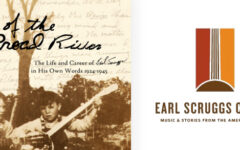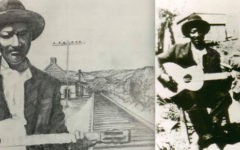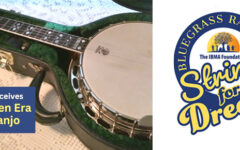
It turns out that Keith Whitley was mistaken when he sang back in 1978, My Home Ain’t In The Hall of Fame.
Today, the Country Music Hall of Fame announced that Keith will be inducted in this year’s class, along with Jerry Lee Lewis and Joe Galante.
Though he rose to his greatest fame as a country artist, those of us in the bluegrass world will always remember Whitley as one of us. Likewise, he sold many times more records in the country market, but we will never forget his soulful singing alongside Ralph Stanley, or his remarkable vocals on the aforementioned album with J.D. Crowe & The New South.
It is almost exactly 33 years to the day that Keith died, on May 9, 1989, losing a long and difficult battle with alcohol. It seems that he followed the example of Carter Stanley a little too closely, and what was an extremely promising career as a headliner in country music came to a sudden and tragic end.
But as we celebrate one of the finest vocalists ever to perform in bluegrass music, let’s focus instead on happier times. We can think about the recordings with Stanley in the 1970s, a few of which also included Ricky Skaggs and Roy Lee Centers. Now that was some singing to remember!
Or the wonderful record that Keith and Ricky did together when they were only 17 years old, Second Generation Bluegrass, from 1971. The two friends has recently joined The Clinch Mountain Boys, and the album was their tribute to the music of The Stanley Brothers. Ralph was such a strong supporter he played banjo on the record.
In one of the greatest true stories in our music, Ricky and Keith were “discovered” by Dr Ralph when they had taken the stage to fill-in at a show in West Virginia the year before, when Stanley and The Clinch Mountain Boys had a flat tire and were late to the gig. Ralph was so taken by the two 16 year olds singing he and Carter’s music, that he hired them on the spot.
When Skaggs left to join The Country Gentlemen, Whitley stayed on with Stanley, and left quite a mark on the band. It’s hard to brag too much on his time with Ralph, and though Stanley had a number of outstanding vocalists in his group over time – Larry Sparks, Ernie Thacker, and Roy Lee Centers among them – there can be no doubt that Keith’s star power shone through even way back then.
His first real star turn came as a member of J.D. Crowe & The New South, where all who saw them on stage marveled at this young man with the huge voice. Crowe even adapted the band sound, and their album, My Home Ain’t In The Hall of Fame, to accommodate Keith’s unique abilities. This was a mighty powerful edition of the band, with Steve Bryant or Randy Hayes on bass, Bobby Sloan on fiddle, and either Gene Johnson or Jimmy Gaudreau on mandolin.
Then in 1983, Whitley made the move to Nashville to take a stab at the wider country market, at a time when traditional country sounds had returned to the fore. His old pal Ricky Skaggs had scored several major hits, re-recording classic songs from Flatt & Scruggs, Bill Monroe, and The Stanley Brothers. Keith’s first album came in ’84, but the huge radio success came with his next two projects, LA To Miami and Don’t Close Your Eyes. The latter contained his cut of When You Say Nothing At All, of which a later version launched the mainstream career of Alison Krauss.
But that was to be his final recording. Just a short time after Don’t Close Your Eyes was released in 1988, Keith was found dead at home on May 9, 1989 from acute ethanolism, also known as alcohol poisoning. He was only 35 years of age.
His drinking had been widely remarked upon by those he had worked with in bluegrass, and many of his friends in Nashville had thought that he was finally in control of the issue, but it was to be his undoing. And what a tragic loss it was.
Congratulations to Keith Whitley for his posthumous induction into the Country Music Hall of Fame. It is a continuing shame that he isn’t in the Bluegrass Hall of Fame as well.







